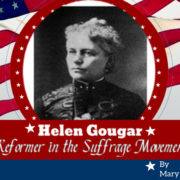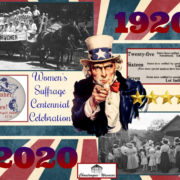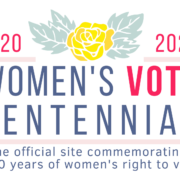Helen Gougar — Reformer in the Suffrage Movement
By Mary Hursh
Helen Mar Jackson Gougar (1843-1907) was an advocate for women’s
suffrage as a lawyer, writer, and lecturer.
Gougar was admitted to the bar by the Tippecanoe County Circuit
Court on January 10, 1895, and in 1897, she was admitted by the
Indiana Supreme Court. As a lawyer, she directly challenged injustices
through the legal system. She attempted to vote in 1894 but was
denied and filed suit against the county election board. She argued for
the constitutional rights of women of Indiana before the county court
in 1895 and the Indiana Supreme Court in 1897. She challenged
suffrage restrictions on the basis that the Indiana Constitution did not
specifically prohibit women from voting. The Tippecanoe County
Superior Court ruled against her and women’s suffrage on April 20,
1895.
As a lawyer, she filed suit against Western Union in 1881 for delivering
the more important telegraphs sent by men before those sent by
women. She sued those who attacked her in the press and tried to
discredit her advocacy of suffrage and temperance causes.
Gougar spent much of her life as a writer. In 1878, she began writing a
weekly column for the Lafayette Daily Courier called “Bric-a-Brac:
Literature, Science, Art and Topics of the Day.” Her focus was on
temperance and social sciences at first. By 1879, she wrote about
women’s suffrage. She argued that it was unfair for ambitious,
educated, politically aware women to be denied suffrage while so many
men voted by party line. She became editor and proprietor of the
Lafayette paper, Our Herald, in 1881. “We shall aim to present facts
and arguments from time to time that will tend to remove undue
prejudice, and educate both men and women to see the justice and
necessity of making the women of our State citizens with full rights and
privileges to protect themselves and distribute their taxes by the use of
the elective franchise.”
The lectern became a familiar home for Gougar early in her life. In
1881, she argued for women’s rights through the American Woman
Suffrage Association. In 1882, she spoke at the National Suffrage
Association convention in Washington, DC. In 1883, she delivered 40
lectures in 40 days with topics such as women before the law and
woman suffrage as a national necessity. She was credited by the
Indianapolis News for delivering 200 lectures a year for 20 years. She
spoke without notes and directly addressed her opponents’ views point
by point. In 1886, she spoke in favor of women’s suffrage in front of the
United States Senate. In 1888, Elizabeth Cady Stanton described Gougar
as the most effective speaker in the movement.
The Nineteenth Amendment to the U.S. Constitution gave women the
right to vote in all elections. The House and Senate passed the
amendment in 1919. The Indiana General Assembly ratified it in
January 1920.
This article is the third in a series on the Women’s Suffrage Centennial sponsored
by Chautauqua-Wawasee, Syracuse-Wawasee Historical Museum, Syracuse Public
Library, Syracuse-Wawasee Chamber and Indiana Humanities. All events are free
and open to the public.
Chautauqua-Wawasee is a non-profit organization which provides life enriching
programs for the northern Indiana region.
Mary Hursh is a freelance writer who lives on Syracuse Lake with her husband
Stanley.




